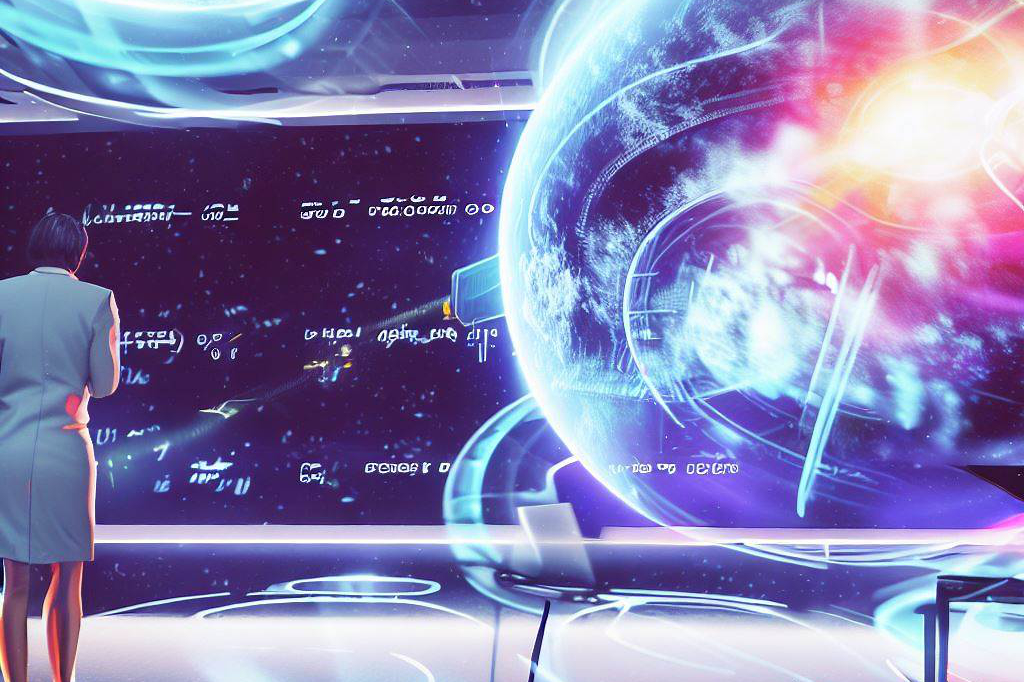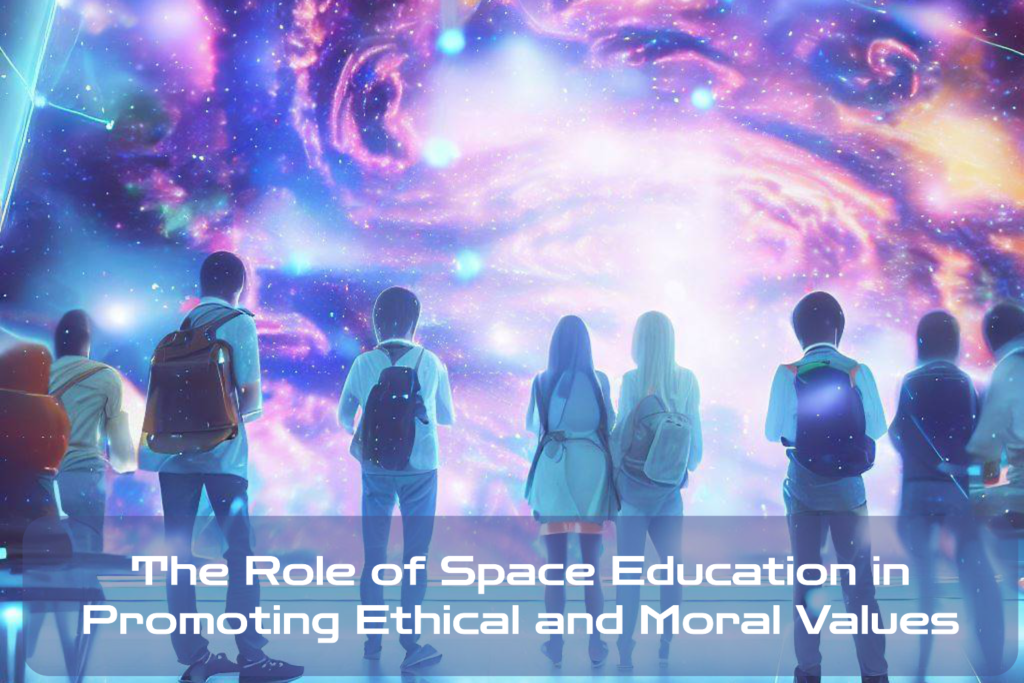The Growing Importance of Space Education
In recent years, space education has gained prominence as a critical discipline for promoting scientific knowledge and innovation. It involves teaching and learning about everything related to outer space, from the science of astronomy to the technology behind spacecraft design. The study of space science also encompasses cross-disciplinary areas such as physics, chemistry, engineering, and biology.
The importance of space education cannot be overstated.
For one, it helps us better understand our universe and our place within it.
It also promotes scientific literacy among students and inspires them to pursue careers in the fields related to aerospace. However, beyond these benefits lies another crucial role that space education plays – that is instilling ethical and moral values in individuals.
The Importance of Ethical and Moral Values in Space Education

Space education encourages individuals to develop not only their technical skills but also their personal attributes, like
- teamwork,
- collaboration,
- responsibility,
- empathy,
- and ethical decision-making capabilities.
Studying outer space teaches us about the fragility of our Earth’s environment, which creates a sense of respect for nature. It can inspire us to become better inhabitants on this planet by making more thoughtful choices.
The primary goal of this article is to shed light on the role that space education plays in promoting ethical values while imparting scientific knowledge.
We will explore how astronauts practice ethical behavior during missions while working in teams with diverse cultures or backgrounds.
We will also delve into how studying space science can help us recognize our moral obligations towards the planet we call home. Overall, this article aims to demonstrate how studying something as awe-inspiring as outer space can help shape individuals’ characters while inspiring them towards a path that’s both fulfilling for themselves personally and productive for society at large.
Understanding the Importance of Ethical and Moral Values

When we talk about ethics, we mean a set of moral principles that govern an individual’s behavior.
On the other hand, morals refer to the fundamental beliefs or values that shape one’s character and behavior.
Both ethics and morals play a crucial role in personal and professional life, as they form the foundation of our decision-making process.
In our personal lives, ethical behavior helps us build strong relationships with our family and friends. It allows us to make choices that align with our values and beliefs while treating others with respect and empathy.
In contrast, unethical behavior can lead to trust issues, conflicts, and even legal consequences. Similarly, in a professional environment, ethics help maintain a fair and just workplace culture that promotes teamwork and collaboration.
It provides guidelines for employee conduct while ensuring accountability for their actions. Employers who prioritize ethical behavior not only create a positive work culture but also increase employee satisfaction, retention rates, and customer loyalty.
The Significance of Ethics and Morals in Personal Growth
Personal growth is an important aspect of life that requires constant reflection on our thoughts and actions to become better individuals.
Ethics plays a crucial role in this process by encouraging us to become more self-aware of our biases or prejudices that may hinder personal growth. For instance, an individual who prioritizes ethical values such as honesty or integrity is more likely to be open-minded towards constructive criticism while avoiding behaviors such as lying or cheating that may impede their progress.
Similarly, moral values such as respect for others’ opinions promote empathy towards people from diverse backgrounds, which broadens perspective on various issues.
The Significance of Ethics & Morals in Professional Growth
Professional growth involves developing skills such as communication or leadership abilities required for success in one’s career path. Building strong ethical foundations ensures employees’ accountability for their decisions made at work, which encourages teamwork and collaboration.
Moreover, it promotes trustworthiness and a positive work environment where employees feel valued, recognized for their contributions, which can lead to improved job satisfaction levels. By prioritizing ethical values such as integrity, employers can create a culture that fosters innovation and creativity.
Ethics and morals are critical elements that shape our character, behavior, and decision-making process in both personal and professional life. By promoting ethical behavior through space education, individuals can understand the importance of these values while appreciating the impact they have on society as a whole.
The Importance of Teamwork, Collaboration, and Communication Skills

Space missions are incredibly complex ventures that require a high level of collaboration among team members. Astronauts must work together to accomplish a common goal and solve problems quickly and efficiently.
Because of this, space education is an excellent way to teach teamwork, collaboration, and communication skills. In space education programs, individuals learn the value of working together towards a common goal.
They also learn how to communicate effectively with others while working in high-pressure situations. These skills are not only valuable in space but also in our personal and professional life on Earth.
How Astronauts Practice Ethical Behavior While Working on Space Missions
Astronauts are held to high ethical standards while working on a space mission. As representatives of humanity, they must maintain their integrity at all times.
This means practicing ethical behaviors such as honesty, fairness, and transparency.
One example of how astronauts practice ethical behavior is through their adherence to scientific protocols. They follow strict guidelines when conducting experiments in order to ensure the accuracy and reliability of the data. Another example is their commitment to safety protocols – astronauts take great care in protecting themselves and their fellow crew members from harm.
In addition, astronauts demonstrate ethical behavior by treating each other with respect and dignity regardless of cultural background or differences. They understand the importance of fostering a positive team dynamic in order to accomplish their mission successfully.
Space education presents an incredible opportunity for individuals to not only gain scientific knowledge but also develop important ethical values such as teamwork, collaboration, and communication skills, as well as moral values such as environmental responsibility. Through the example set by astronauts who practice these values on missions in space we can learn how these values apply on earth too – making it easier for us to make responsible choices that benefit our planet.
The role of space education in promoting moral values

Understanding the impact of human actions on the environment
Space education provides an opportunity for individuals to develop a deep understanding of the impact that human actions have on our planet. This is particularly important in a world where climate change is becoming an increasingly pressing issue. Astronauts who have been to space often return with a newfound appreciation for the fragility of our planet and the need to take care of it.
By studying Earth from space, they are able to observe firsthand how interconnected everything on our planet is. Space education also provides a unique perspective on environmental issues such as pollution and deforestation.
Students can learn about how these issues are impacting our planet and what steps we can take as individuals and as a society to address them. By instilling a sense of responsibility towards the environment, space education can help create a generation that takes environmental issues seriously and works towards creating sustainable solutions.
Developing a sense of responsibility towards the planet
One important aspect of moral values is taking responsibility for one’s actions. Space education can help students understand their role in caring for our planet through practical applications such as recycling, reducing waste, conserving energy, and using sustainable resources. In addition, astronauts often talk about their experiences in space and how it has influenced their environmental consciousness.
Through hands-on activities such as building habitats or designing life-support systems in simulated environments, students can gain an appreciation for how delicate ecosystems work together to support life on Earth. They may even develop innovative solutions to challenges related to sustainability that could be applied here on Earth.
Challenges Faced by Educators

Promoting ethical and moral values through space education is not an easy task for educators. As much as this kind of education is essential, it comes with its own set of challenges.
One challenge that educators face is limited resources to teach ethics and morals. In most cases, schools may not provide enough opportunities for space education programs to promote ethical and moral values.
While there may be some resources available for scientific studies, like telescopes or microscopes, the same cannot be said about resources for teaching ethics and morals. Another significant challenge that educators face is the difficulty of measuring the effectiveness of teaching ethics through space education.
Measuring the impact of a particular program on moral values can be challenging since there is no standard way to measure such things. It’s hard to tell whether someone has become more responsible towards the environment or has learned teamwork skills through a space education program.
Resources
Moreover, resources are scarce when it comes to teaching ethics through space education. The cost of these programs can be high, therefore limiting their accessibility to all students who need them.
In addition, educators lack proper training in teaching ethics and morals through space education programs because there are inadequate syllabi available in this field.
One way that teachers could overcome this barrier could be by partnering with local organizations that have knowledge of promoting ethical behavior through various activities like volunteer work or community service.
Final Thoughts

As we look towards the future, we need leaders who are not only well-versed in science but also have strong ethical and moral values. Space education can play a crucial role in shaping such leaders by promoting teamwork, collaboration, and communication skills along with ethics and morals.
By teaching us about our place in the universe, space education brings people from different nations together for a common goal that transcends national borders – exploring beyond Earth’s boundaries. It provides an opportunity for humanity to come together as one community with shared interests.
This sense of unity can help build a better society where everyone respects each other’s differences while working towards common goals, thus fostering respect for diversity.
Space education is not only essential for scientific progress; it is equally important for building strong individuals with sound ethical and moral values that can contribute positively to society’s growth.

C M, a seasoned editor, journalist, and consultant, is deeply fascinated by the convergence of technology, space, and the future of humanity.
With a particular interest in transhumanity, futurology, and the philosophical and ethical dimensions of these domains, C M serves as the lead contributor to SpaceSpotlight and TranscendSphere.
When not penning insightful articles on these rapidly evolving fields, C M indulges in their love for podcasts and books, proudly embracing their status as a ‘Happy Nerd Extraordinaire!’



